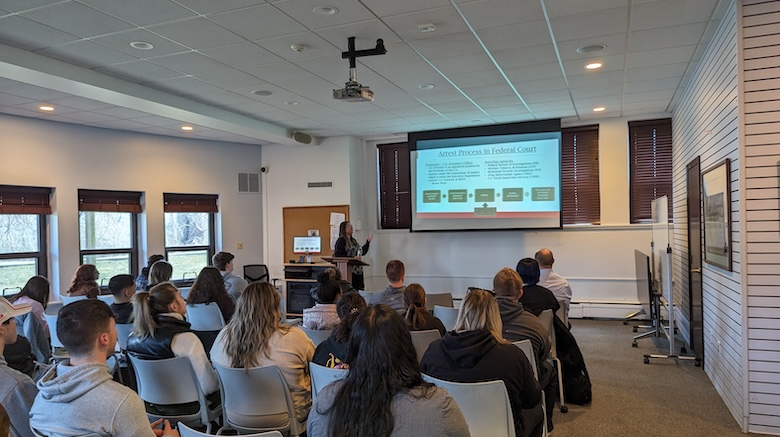A U.S. Pretrial Services Agency officer spoke with dozens of criminal justice majors this semester during a presentation in the Long Island Campus’ Shea Conference Center.
Mallori Brady, who works in the agency’s Eastern District (out of Central Islip) and is currently involved with the Federal Judiciary Court’s Leadership Development Program, delivered a presentation about the role and responsibilities of the U.S. courts, pre-and-post conviction, for federal crimes.
Brady discussed her career path as a former criminal justice and forensic psychology student who has worked in the various field positions for 14 years.
“Officer Brady provided students with a perspective on the criminal justice system that very few are exposed to — federal courts, pre-trial investigations and probation,” said Jason Ostrowe, Ph.D., assistant professor of criminal justice at St. Joseph’s Long Island Campus.
“Moreover, she discussed opportunities for careers in federal service for students of different academic backgrounds,” he added.
Her work in pretrial services involves bail investigations and reports of those charged in federal crimes and supervision of persons pending federal plea of trial. This includes general and intensive supervision of those charged with sex offenses, narcotics and firearms trafficking, and financial crimes, in addition to those suffering from mental health disorders or substance abuse concerns.
Brady is her district’s representative for the Federal Pretrial and Probation Association (FPPOA), a member of the Crisis Incident Stress Management Team (CISM), and co-facilitator of the Successful Transition to Incarceration and Re-Entry (STIR) program.
Brady earned a bachelor’s degree in criminal justice, and later a master’s in forensic psychology. She has worked for New York City’s juvenile justice and probation departments.
The Feb. 29 event was hosted and sponsored by St. Joseph’s Criminal Justice Department.
“Hosting events with criminal justice professionals are invaluable, as they provide students with opportunities for networking, social engagement and learning outside the traditional classroom,” Dr. Ostrowe said.

